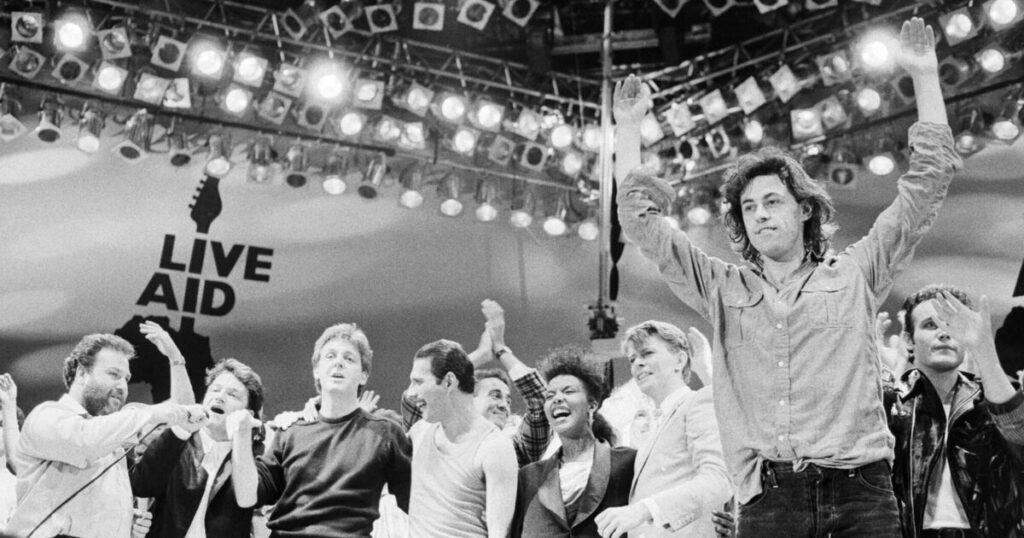I won’t hear a bad word said. 40 years on, haters gotta hate, gripers gotta gripe and all that, the picking of holes is inevitable. It’s what the internet does. It would cancel Mother Teresa if it got time. But Live Aid was a brilliant, brilliant thing.
Anyone doubting this should watch the part in the BBC documentary series, where an Irish nurse tells a dad that his four-year-old daughter is passed saving. It is too late for this little one, she says as gently as she can. Amongst so many similarly stricken children it appears inevitable.
But, unable to talk English, he touches the nurse’s hand to his daughter’s chest. It is still warm. The nurse tries again. The camera then shows that girl, Birhan Woldu, now 44, sitting with her dad. It is very powerful. Just one of the thousands of lives saved by a 7-inch single.
Forty years is a long time. You can’t help but look at where you were then and what you did. The bands were beautiful, and young, but so were we. And Bob Geldof created something that we drew us in, mesmerised us and made us all feel we were doing something not just worthwhile, but magical.
As a result, the memories of ‘where you were’ tend to be seared into people’s minds. I asked on X – yes it still has some uses – and the responses were warm and loving; “In a beach cottage with my first girlfriend/love of my life,” “My granny’s house in Monaghan” or “the front room of my house in Derry with 10 E-180 video cassettes.” A friend told me of watching it with her first boyfriend’s parents, an awkward “meet the in-laws” moment expanded into a 12-hour TV marathon. Another watched it in a soccer hall in Belfast in which the Troubles, then rampant, were given a day off as Catholics and Protestants sat down together.
For my part the night before, my band, then only a few months old, was playing a “14 Band Bash” at the Ivy Rooms in Dublin. We and others like The Slowest Clock, The Garden Hasn’t Changed Much and Winter’s Reign could only really get a crowd by playing together.
We adjourned to a house party in Phibsboro, and it was there that the next day I saw the opening notes of Live Aid. That was the moment when the sheer enormity of it hit us. “Oh Bob,” I thought, “what have you done?” and rushed home to watch the rest.
The rest of that day is a blur. My parents made tea but there was no switching the channel (to one of the other three.) Friends called in and out. We had seen nothing like it. Five a side was cancelled. More tea was made.
I watched with a mixture of nervousness and awe. Nervousness to see two Irishmen at the centre of it, and not just at its centre but driving it, owning it, inspiring it. And awe at the sheer enormity of it.
McCartney seemed almost like a forgotten man at its end. The Beatles in 1985 seemed further away in history than they do now. His mic briefly not working only confirm ed that. The Beatles had just been so long ago.
Costello singing their anthem was more of the moment. This was more about were The Beatles had been going than the ex-Beatle now was. All you needed was love and a driven organiser with vision and a steely nerve.
This was the Summer of Love 1980s’ style, doing something practical and saving people’s lives. The power of music, the “language of rock’n’roll”, as Bob put it, had never been more evident.
The “cocky” Irishman that had floored me at Dalymount in 1977 was simply unstoppable. An Irishman that could accost Thatcher and convince her to waive the VAT on the single’s sales or tell an Ethiopian dictator to “F**k off.” An Irishman doing all that.
On a musical note, it should not be forgotten that this was a partisan music era. If you liked The Rats you hated Spandau Ballet. If you liked Adam Ant you hated Nik Kershaw. No one liked the Style Council-era Paul Weller. If you liked Status Quo, help was available.
Those of us who music knew that If Bob could get those disparate acts onto the same stage he was capable of anything. I suspect he still is.


